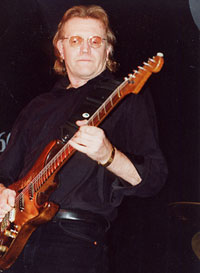 Lonnie Knight and Big Shoes
Lonnie Knight and Big Shoes
We've talked in the past here at Blues On Stage about the wealth of musical talent residing in the Twin Cities area. One of those long time residents (more than 4 decades of playing) is Lonnie Knight. A guitarists who stands head and shoulders above many of his fellow musicians (both literally and figuratively since he is about 6'5" and is one of those handful of exceptional players you don't hear too much about). I overheard a musician at the Brewbaker's guitar showcase recently comment about Lonnie's guitar playing after seeing him for the first time, saying, "this guy is REALLY good." That's the type of comment you often hear when you see him play.
I caught up with Lonnie and his band, Big Shoes, at a recent Poodle Club show were we discussed doing an interview. The following is the result of that initial discussion.
Ray: Tell me about your early background. Where and when you were born and raised?
Lonnie: I was born in New Jersey. My father was transferred to Minneapolis when I was 6, so I've lived most of my life right here.
Ray: How did you first become interested in music?
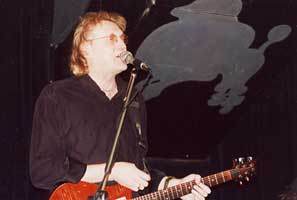
Lonnie: I heard a song called "Rawhide" by Link Wray and the Wraymen when I was a little kid... Compared to the classical and big band stuff my parents listened to, it turned my head around. I fell in love with all those old guitar instrumentals, Jorgen Ingman, the early Ventures, Duane Eddy, a lot of one hit wonders.
Ray: When did you realize you wanted to make music your career?
Lonnie: It just happened. I don't think I made a conscious decision. When I found out I could get paid to play, I just went with it.
Ray: When and how did you first begin to play the guitar?
Lonnie: I started when I was around 12 or 13. There was a music store going broke in Richfield, and the owner was actually going door to door to try to get parents to sign up for lessons for their kids. I yammered long enough, and got signed up.
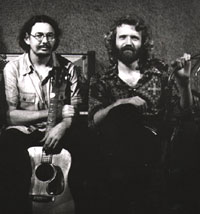 [Norman Blake & Lonnie Knight at Charlotte's Web, Rockford, IL (circa mid 70s)]
[Norman Blake & Lonnie Knight at Charlotte's Web, Rockford, IL (circa mid 70s)]
"Norman and I played a three or 4 night stand at Charlotte's Web. They had an old farmhouse in Rockton that the acts stayed at, so we were both holed up there for a few days. We worked up a duet of "The Old Brown Case," from the Fields of November album... Norman rumbling away like it was the easiest song in the world, and me hanging on for dear life..."
Ray: Who are some of your early guitar influences and what impressed you about their particular style?
Lonnie: Jeff Beck's name always comes up first. He had such an individual "signature" from the very beginning. I was with a band called the Rave-Ons, we opened for the Yardbirds at the Detroit Lakes Pavilion. I learned more in one hour standing by the stage than I had in 2 years of lessons. James Burton influenced me, he was simply present on so many early rock records (Ricky Nelson, Elvis, etc.). I worked with Dick Wiegand (later with Crow) on guitar in the Rave-Ons... Dick was always crawling into the nuances of style... He taught me more than anyone as he and I learned together. Acoustically, I was drawn to Bert Jansch from the Pentangle, and Joni Mitchell, of all people. Joni's an amazing rhythm player, not to mention her bizarre tunings, etc. I learned a lot about space from her playing.
Ray: I notice you play some slide guitar, who influenced your slide style?
Lonnie: Lowell George and Bonnie Raitt. I play slide in normal tuning, the only "trick" I have is to angle the slide to play the major 3rd and 5th (or 5th and dominant 7th, etc) on the G and B string. That opens it up to voicings that I can't get by just laying the bar across the fretboard.
Ray: Have you always been interested in the Blues or when did that come about?
Lonnie: Yes and no. Before there was a musical category for every color shirt you wear, you could hear EVERYTHING on one radio station... Jimmy Reed dovetailed into Leslie Gore... The blues were the only place anyone was really playing guitar that interested me, until the Ventures came along, then Hendrix, etc. The first songs I ever learned were blues songs, then I got swept away by the British revolution... I gravitated more toward the blues-inspired bands (Cream, Animals, etc)... Then I got lost in the folk music scene, traveled to Greenwich Village with a Martin over my shoulder... I even worked producing country demos in Nashville for a short time. But the blues was always there, one way or another. If you listen to Big Shoes now, you can probably hear chunks of everything I've done over the years. Blues is the framework we build on.
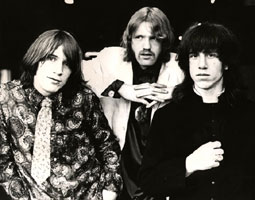 [Jokers Wild: Denny Johnson, Lonnie Knight, Pete Huber (1969)]
[Jokers Wild: Denny Johnson, Lonnie Knight, Pete Huber (1969)]
Ray: Tell me about your band history -- when you started playing in bands, who you played with, type of music, etc.
Lonnie: Rave-Ons (Dick and Larry Wiegand, Harry Nehls) - the 60's - We played sort of psychedelic garage rock blues. Same with Jokers Wild (Denny Johnson, Pete Huber). We did a lot of original stuff, and the covers ranged from Cream to Eddie Floyd (Knock on Wood). The band broke up when our drummer contracted spinal arthritis, and I went out as a soloist for a few years, doing everything from James Taylor to Bert Jansch to Waylon Jennings to LK stuff. I was on the Bitter End college coffeehouse circuit for a while. Then I got caught up with Billy Steiner and some Mankato boys, in a band called City Mouse. They have reunions, you can FILL a small bar with City Mouse alumni. Next was the Knight-Henley band (Mark Henley, gifted songwriter... this is also the band where I met Reid Papke, Big Shoes' bassist). We were too eclectic for our own good. We covered the Stones, Little Feat, Weather Report, Jimmy Buffet, John Conley, etc... A lot of crowds loved us, but a lot of them just stood there scratching heir heads...
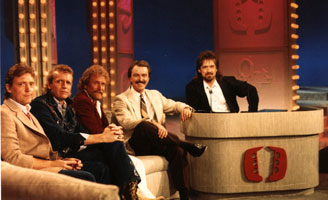 [Tom Eckhoff, Lonnie Knight, Gary Neilsen, Charlie Chase, Jack White at taping of "Nashville Now" (circa 1993)]
[Tom Eckhoff, Lonnie Knight, Gary Neilsen, Charlie Chase, Jack White at taping of "Nashville Now" (circa 1993)]
After that I drifted through a couple country bands (Wild Horses, Neilsen-White) and in '94 I replaced Charlie Bingham in the final year of the Hoopsnakes. David Eiland was in that incarnation as well (tribute to Charlie, when he left the band Bruce hired 2 guys to fill the slot).
When Bruce left to join Jonny Lang, I landed in a band called the Amazing Cyclones (Gene Hommes, J Hancuch and Scott Nye), which became Lonnie Knight and Easy Money (J, Scott, Kris Karr ran sound and filled in on harp), which became Lonnie Knight and Big Shoes, initially Bart Guthrie on drums, Carolyn Gronfield on keys and Richard Fadness on bass. Reid replaced Richard several months later.
Ray: How did your association with the Hoopsnakes come about?
Lonnie: Actually, I was trying to get into Lamont Cranston. I was with the Neilsen-White band, we did a show with Cranston at Diamond Dave's (yes, the eventual famous Dave) in Wisconsin. I had heard that Larry Hayes might be leaving the group, and was lobbying for an audition. I got advance word on the Charlie-leaving-rumor from Tammi, Cranston's sound tech, so I called Bruce. He and I sat down and played for an hour or two in his living room, and he called me a few weeks later and told me I had the gig.
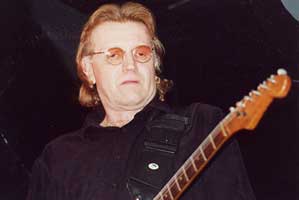
Ray: Any interesting stories you care to share about those experiences?
Lonnie: The Hoopsnakes was the most professionally organized band I'd ever been in. We rehearsed weekly, had a full crew that did everything... an actual payroll, Christmas bonus... it was delightful. One of the high points for me was opening for Koko Taylor at Buddy Guy's Legends in Chicago. We were sound-checking, and it dawned on me how many amazing guitarists had stood on the stage where I was tuning. That was intimidating enough... and just before we started our set, in walked Buddy and his entourage... they took their seats about 10 feet from stage left (my side). Great evening.
As far as drunken revelries, back-stage hijinks... nothing. The Hoopsnakes were very business-like and professional, start to finish... My only regret is that we didn't have an opportunity to record together. "10 the Hard Way" was finished just before Charlie left, and Bruce lit out with Jonny before plans were solidified for the next project. I do have some great board tapes, though.
Ray: What types of music, and who, do you like to listen to today? Do you see any of this new listening influence your playing or musical direction?
Lonnie: I listen to classical music at the end of the day... I've been listening to some Celtic stuff, the Irish Uillean bagpipes, especially. I've been listening to Eric Johnson a lot lately. His phrasing is quite unlike a lot of the other players I hear, I'm actually woodshedding a little to figure some of his stuff out. My good friend Charlie Erickson, (who wrote "Just Keeps Goin' On" on the new CD) is one of those house music player-writer-sound-sampler kind of guys. He and I are talking about a collaboration of some sort... Listen to Jeff Beck's latest CD, it's that kind of idea.
I don't listen to a lot of "new" music these days... Most of it's not new, and not well-done. My tastes have always been pretty eclectic, it helps keep me from getting in too deep a rut in my own playing.
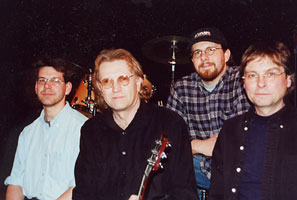
Ray: You spent some time as a solo acoustic player; tell me about that (what type of music did you play, what venues, etc.)?
Lonnie: (Some of this is answered in an earlier question.) I did the acoustic thing mostly in the 70's. There were quite a few bars that featured "folk" acts at the time, and I did a couple years touring the country doing college concerts and coffee-houses. There was a lot of freedom in the solo gig, but I ultimately realized that I prefer ensemble playing. There was nobody around to share the joys of a good gig, or the agony of a bad one...
Ray: You've been around for some time and have observed the music scene over a number of years. How do you see the blues scene today compared to what it was like when you first started playing?
Lonnie: I really need to be careful when I answer these kinds of questions. What's happening to the blues is sort of what happened to country at one point in the 80s. It has become mainstream - you hear it in commercials, you can have the blues if your paper towels aren't as absorbent as your neighbors. It's great, in the sense that there are more venues, etc., and more exposure... but it also gluts the market with players, and people who want to be players. When Waylon and Willie came along and did the outlaw-country thing, it was fresh and unique, it also paved the way for country turning into nothing more than "pop-music-with-cowboy-hats." The same thing could happen to the blues. And you know what? I'm guilty of it, too. The blues has always been a major influence on me, but I am not a pure blues player, nor would I ever try to be. But blues is the springboard for everything else I do... I don't know if I'm diluting the gene pool or simply widening the playing field. The danger to the blues is playing it without understanding.
There are a lot of "blues bands" around who think Stevie Ray Vaughan invented the 12 bar progression. That's a little scary. The blues has less to do with chord progressions that it does with a certain musical sense, a type of spirituality, if you will. B.B. King never played a licked that can't be imitated (the notes, anyway) by any fledgling garage guitar player. But when it's B.B., you know it. What is that? There's something that defines the music that goes way beyond the notes, the chords, the lyrics... it lays down there somewhere in the emotional soup. If you ask a real blues player why he plays, he might not say it in so many words, but lurking there somewhere would be the answer, "Because I can't NOT play." I've heard classical violinists and Irish pipers play pure blues, and I've heard "blues bands" play 3 hours of 12 bar tunes and never play the blues.
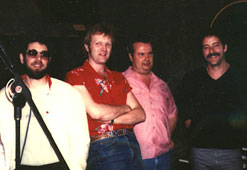 [Miles Wilkenson, Lonnie Knight, Pig Robbins, Mark Henley at Pete Drake's studio, Nashville (circa 1980's)]
[Miles Wilkenson, Lonnie Knight, Pig Robbins, Mark Henley at Pete Drake's studio, Nashville (circa 1980's)]
Ray: How has the club scene changed over the years?
Lonnie: Different addresses... No, really... There used to be 7 night a week venues all over town (same band, a week gig...), one nighters were the rarity. The pay scale hasn't changed much in most rooms, and when you take Monday through Thursday out the equation, there are a lot fewer places to play. There are a LOT more bands, a lot more choices as to how to spend that Friday night disposable income. Other than that, it hasn't changed much. You still go from the venue with house sound and lights to the joint where the "stage" is that flat spot over there between the broken folding chairs and the juke-box.
Ray: What's your opinion of the newer young guitar players who have come on the scene in the past few years?
Lonnie: Jonny Lang is a 60 year old black man with a white kid's skin wrapped around him... he is absolutely the real deal. He is also pretty much a one-of-a-kind. After Jonny hit the scene, a bunch of fathers got stars in their eyes and started pushing their mildly talented kids into the bars. When I was a kid, we all had bicycles... we did not all ride in the Tour de France. Now every kid has a guitar... I think I'll stop there.
Ray: After the Hoopsnakes you stared Easy Money is that right? Tell me about that group and how it evolved into Big Shoes?
Lonnie: (Got some of this earlier)... Easy Money evolved out of the Amazing Cyclones when the leader of that band quit to work night shift.
Ray: Any significance to that name, Big Shoes?
Lonnie: I was trying to come up with a new name for the band when no one from Easy Money was still in it... I broke the big toe on my right foot several times years ago playing water volleyball, and occasionally I stub it on the stairs for no apparent reason... That happened while I was thinking of a name for the band, and I looked down and said "Big Shoes." My feet are size 13.
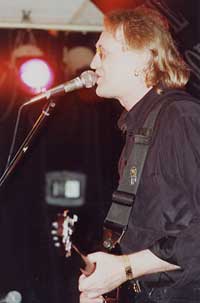 Ray: Tell me about your recording history (CDs, players, style, production, etc.)
Ray: Tell me about your recording history (CDs, players, style, production, etc.)
Lonnie: The Rave-Ons and Jokers Wild cut some stuff in the 60's at Kay Bank (which is now Creation, on 26th and Nicollet). We had a couple singles out, they occasionally show up on weird garage band compilation CDs. In the early 70's, through Keith Christianson, I was introduced to Herb Pilhofer and had a long run as staff guitarist at Sound 80 Recording Studio. During that time I did 2 albums for Symposium Records (Kottke's first label), produced by George Hanson. I played on a ton of commercials from 1970-something on. I played on most of Neil and Leandra's albums, did some stuff with Prudence Johnson, Mary Jane Alm, Bonnie Koloc and Jim Post out of Chicago, many regional acts. I recorded an album's worth of material with Mojo Buford many years ago... I think the masters have disappeared, and unfortunately the stuff was never released. I also have some finished demos of my stuff from the Sound 80 days, with the players from Flim and the BBs... (Bill Berg, Bill Barber, Jim "Flim" Johnson).
Jingle sessions allowed me to work with some of the absolute best players in town... Billy and Ricky Peterson, Rich Dworsky, Herb, Bruce Kurnow, Peter Johnson, Gordy Knudtson, Bill Berg, Bill Barber, Jim Johnson, Dave Karr, a host of wonderful MN Orchestra and jazz players. I was in way over my head for a lot of that stuff... but experience is a hell of a teacher.
I worked with Wrensong Music in St. Paul and Nashville for a couple years, producing songwriter demos. Played with a lot of Nashville heavyweights... most notably, Randy McCormick and Spady Brannon (who wrote some hits for Dolly Parton and Kenny Rogers), Bruce Bouton (Ricky Skaggs' steel player), and the legendary Pig Robbins.
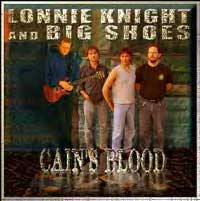 LK's discography highlights:
LK's discography highlights:
The 60's:
The Rave-Ons
I Want You to Love Me/Everybody Tells Me (Twintown single)
Baby Used to Be So Shy/The Line (Re-Car single)
Whenever/Love Pill (Twintown single)
Jokers Wild:
All I See is You/That Man's Not You (Metrobeat single)
Sunshine/? (Metrobeat single)
Peace Man/? (Metrobeat single)
The 70's:
Family in the Wind (Symposium album)
Song For a City Mouse (Symposium album)
Lots of album sessions and jingles
The 80's:
Nothing from me, but lots of sessions
The 90's and...
Again, lots of sessions and jingles
Big Shoes (Aquarium/Roommate CD - 1999)
Cain's Blood (2002 Aquarium CD) - Cain's Blood was recorded at TwoFish Studios in Mankato. Players were Marc and Reid from the band, keyboards from Scott Greenwood, Tim Wick (René Austin), Dale Haefner (City Mouse), Chuck Love (Monkeybox/Nymphonix), and Bill Barber (Flim and the BBs), backup vocals by City Mouse and Andra Suchy, harp by Billy Steiner.
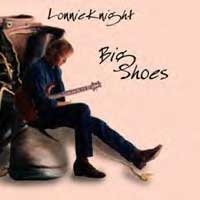
Ray: You also have a recording studio and record production business. Please tell me about them.
Lonnie: I just threw some stuff into the basement around 12 years ago. It's an 8 track analog studio, tied to a Macintosh with some ProTools stuff now. I initially wanted a place to write and work on my own material. I had been musical director for a vocal quartet who paid well, so I bought some stuff. I wound up doing some writer demos for a friend of mine in the publishing business, and suddenly found myself with a client list. I have produced several CDs for local artists (country, folk, rock), some gospel stuff and a few commercial things. The first CD, "BIG SHOES" was recorded here. I don't really do much with it right now, I've been concentrating daylight hours on my web design company.
Ray: In addition to your recording studio, production business, band leader and guitar player, you also write. Tell me a little about your song writing process?
Lonnie: I don't have a "process," per se. I am totally undisciplined... if an idea comes in from somewhere I run with it, usually a line of melody and lyric, a tag line, something. A lot of times it never gets any further than that, I've thrown away a lot more than I've kept. Many times I'll just sit and play the acoustic, no specifics in mind, if I hit on a feel, a couple chords, I try to throw them down on a cassette before I forget what I'm doing. Some songs write themselves quickly ("This One's For You" and "Just Ride the Train" from BIG SHOES), some take forever ("In the Rain" from CAIN'S BLOOD was started when I was with the Hoopsnakes, the melody and chord progression were finished last fall). I am my own worst critic, and as a result, I am not a very prolific writer. I am not an autobiographical writer. Although some stuff has come from true experiences, I need to remember that I'm attempting to make art, not writing a news article.
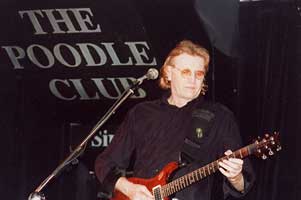
Ray: For the technical people reading this can you tell me about the equipment you use?
Lonnie: My main electric guitar is a 1987 Paul Reed Smith. I also play a reworked and rewired 1963 Strat, and I just picked up a new Godin LGX-SA. It's a 3-voice guitar... 2 humbuckers with a Baggs transducer saddle for acoustic sounds, and a Roland synth-pickup built in.
For acoustics, I have a 1969 Martin D-41 with a Seymour Duncan under saddle pickup and an L.R. Baggs pre-amp, and a Martin Sigma classical, also with a Duncan under the saddle.
I have a Fender "Evil Twin" for larger rooms, and a reworked 70's era Fender Vibrolux that I use most of the time these days. I have fooled around with digital multi-effect stuff, and keep going back to a couple stomp boxes. They let the actual guitar come through. I use a Boss compressor, occasionally a Boss overdrive (the yellow one, VERY sparingly), a Boss Flanger and a Boss chorus. I also have a little 6 band graphic eq stomp box, I set that flat but gained, to bring the level of the Strat and the Godin up to the PRS. The PRS pick-ups are mercilessly loud and dynamic. And I just picked up a Line6 delay box, it will ultimately replace the Roland rack delay that I have been using.
Ray: Where do you see your music heading in the future?
Lonnie: I honestly have no idea. Influences filter in, from the people I play with, from things I hear. I am listening to a wide variety of American "roots" music. Paul Metsa finished his song "Jack Ruby" by segueing into Dylan's "Times They Are a-Changing" the other night. That struck a nerve... that feeling, that thought will show up somewhere...
On the business side, I just signed with American Masters Entertainment (www.americanmastersinc.com). They'll be taking over our booking and management, and also be doing some key work in the promotion of "Cain's Blood." We start recording a new CD this summer, so I'm currently in writing and song-finding mode.
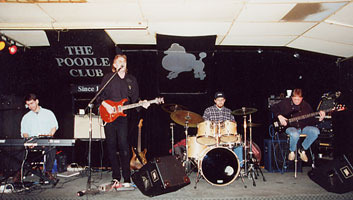
Ray: Where can people see you playing now?
Lonnie: We're playing a lot of the area clubs. Our schedule is usually in the Twin Cities Blues News. Marc and I co-host a jam session every Sunday night at Inn Kahoots in Hamel, with Mike Carvale from the Cranstons, Tim Murray from Slim Hippos, and Ev Smithson from the Alley Katz.
Ray: Are there any other comments you would like to make on something I may not have asked?
Lonnie: I think you pretty well covered things, Ray... I just wish to state for the record that any opinions expressed in this article are driven by the time of day and the amount of coffee I've had, and are subject to change at a moment's notice. And to remind everyone to keep supporting the local live music scene. We need you.
Members of Big Shoes (along with Lonnie Knight):
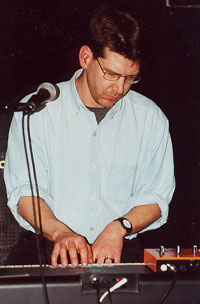 David Hupp: keyboards
David Hupp: keyboards
My elderly Portuguese piano teacher warned me to "never play in coffeehouses." I moved to Twin Cities from Indiana in 1990. Dropped out of grad school in philosophy because it was interfering with my music.
First blues/r&b bands were the Chaccones and later the Supernaturals, with Charlie Lawson fronting, me on guitar, Kevin Boyle on bass (there were others too but the three of us were constant in the two incarnations- this was around early to mid 90s).
Spent some time with loosely organized jazz/blues groups, filled in for Cornbread Harris a couple times. Still occasionally collaborate with Glenn Graham (tenor sax). Joined hydraulic jack by inviting myself up to play with them one night at the Viking. They later found out I could play piano and made me switch. Invited to join Joe T. Cook and the Longshots while they were holding down Thursdays at the Times Bar and Cafe. Appeared on their recent album "Longshot." Bruce McCabe is the other piano player on that disc. Still play with the Longshots from time to time. LK came to the poodle one night (6 months ago?) to steal me from hydraulic jack. Theft still in progress. I'm married to Katy. 2 dogs
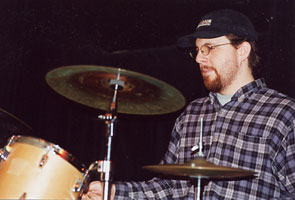 Mark Bohn: drums
Mark Bohn: drums
Drumset Instructor, General Music Inc., March 1993 - present. Responsibilities include providing a private, 1/2 hour drumset lesson
each week as well as inspiring and motivating the students. Professional Drummer, Various Groups, April 1993 - Present. Responsible for providing music and entertainment for night clubs, private parties, etc.
Drummer for various local songwriters, dedicated to creating and performing original music. Involved in the orchestra of productions of South Pacific, Nunsense and 42nd Street at various community theaters/colleges.
Groups I've played with include: Track One, The Fabulous Pearls, Pork Chop, Slim Hippos, The Tom Hunter Band, Joe T. Cook and the Longshots, Ross William Perry, Terraplane Blues Band, The Blue Riders, Murali Coryell, & Scooter Trash.
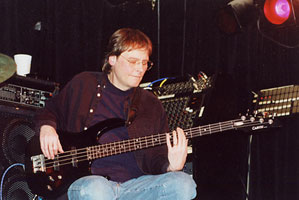 Reid Papke: bass
Reid Papke: bass
Been playing in bar bands since 1973. Switched from guitar to bass in 1980 to play with the Knight-Henley band. He played country for a while with the Cowboy Angels, who did numerous opening stints at the Medina Ballroom. Reid has been a journeyman musician all his life. He once played a classical guitar piece to a packed house at the Guthrie Theater. His recording credits include Neal and Leandra and Suzanne Bauer, plus commercial work. He and Lonnie joined up again in Big Shoes in 2000.
To order the CDs, contact or book Lonnie Knight and Big Shoes:
Email: BigShoes@LonnieKnight.com
Web: www.LonnieKnight.com
To order CDs: www.lonnieknight.com/buydisc.html
Phone, Lonnie Knight Productions: 612-722-5467
New Booking: American Masters Entertainment (www.americanmastersinc.com) coming soon.
 You can now order other CDs, books, and videos from Blues On Stage in association with Amazon.com. Simply click on the logo at the left and shop! They have some of the best prices on the web and even offer some used product at lower prices.
You can now order other CDs, books, and videos from Blues On Stage in association with Amazon.com. Simply click on the logo at the left and shop! They have some of the best prices on the web and even offer some used product at lower prices.
This interview is copyright © 2002 by Ray Stiles, and Blues On Stage at: www.mnblues.com, all rights reserved. Copy, duplication or download prohibited without written permission. For permission to use this review please send an E-mail to Ray Stiles.
Web Hosting & Design:
Web Hosting & Design. Find out how you can host your current site at Blues On Stage web family or how I can help you get your own website!
If you would like your CD reviewed, please send TWO (2) copies, along with promotional material to:
Blues On Stage
PO Box 582983
Minneapolis, MN 55458-2983
E-mail Ray Stiles @ mnblues@aol.com with any questions.
